Something to Chew On
Eons ago, I went to hear novelist Rita Mae Brown read. When someone asked for advice on becoming a writer, Brown said, "Learn as many languages as you can. Once you do, you'll understand the roots of words, and you'll make connections. Bells will go off!"
Inspired by this idea, I took up Spanish and later Japanese. (I had hated language study in childhood and never thought I'd be doing such a thing voluntarily.)
Years later, I had dinner with a relative who wanted to know why I was studying Japanese, of all things. I mentioned Rita Mae Brown's suggestion. He scoffed, "Well, that makes sense if you're studying Romance languages. But not Japaneeeeeese!" (His sneer made the word twice as long as it needed to be.)
I couldn't defend myself. For one thing, I'm bad at producing instant retorts while reeling from an unexpected attack. For another thing, Japanese has taught me about English countless times, but there's a nebulous quality to those discoveries, and I can never recall them on demand.
Last weekend I had one of those discoveries, and I still feel thrilled, not only because I've delivered a mental "so there!" to my relative but also because it's exhilarating to make connections between languages.
Here's what happened. Tomorrow I head to Tokyo, where (among other things) I'll go out for Korean food with Kensuke-san, my language partner. (He lived in Korea for years.) As we chatted on Skype last Saturday, he showed me restaurant options online. For instance, he directed me to this page, then to the following picture, as he craved that dish in particular:
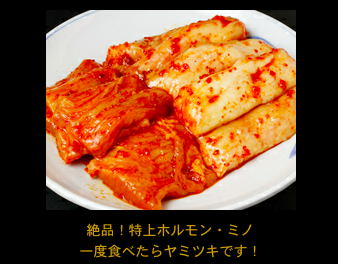
It looks to me as though this concoction could light someone's stomach on fire. Kensuke-san says it's mild, but I don't know.... Anyway, what is this dish?
He answered in Japanese, mentioning these words:
内臓 (ないぞう: internal organs; intestines; viscera)
小腸 (しょうちょう: small intestine)
Not very appetizing! A bit too graphic for me!
We examined the caption:
絶品!特上ホルモン・ミノ一度食べたらヤミツキです!
The kanji words were easy enough to figure out (especially with a dictionary!):
絶品 (ぜっぴん: unique or superb article)
特上 (とくじょう: extra-special)
一度 (いちど: once; one time)
食べる (たべる: to eat)
The katakana caused more problems. Although ホルモン means "hormone," Kensuke-san wasn't sure about the role of hormones here. At the end, ヤミツキ is an alternate rendering of 病み付き (やみつき: being addicted to). And then there's ミノ.
Breen defines ミノ as "cow rumen." Now what's a "rumen"? Time for an English-English dictionary, where I found this definition: "the first stomach of ruminating animals, lying next to the reticulum."
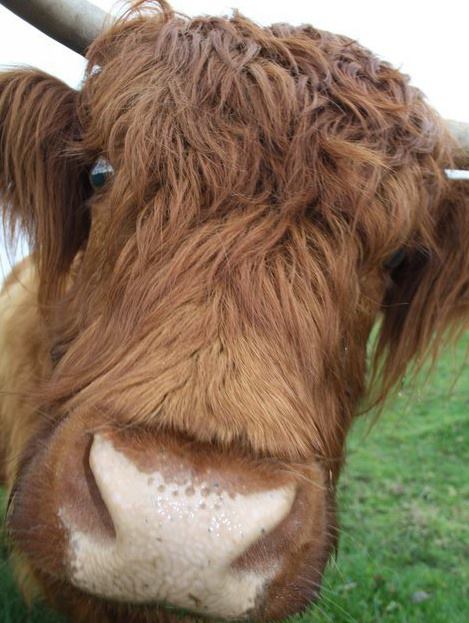
Photo Credit: Jennifer Hoogland
A ruminating animal? One who thinks a lot? "Ruminating" was hyperlinked, so I clicked and found this definition:
1. to chew the cud, as a ruminant.
2. to meditate or muse; ponder.
Oh, dear. I didn't know "ruminant" and began feeling that I was lost in a dictionary loop, a cruel prank played on the inquisitive. But that word also had a link, and I found that "ruminant" primarily means the following:
any even-toed, hoofed mammal of the suborder Ruminantia, being comprised of cloven-hoofed, cud-chewing quadrupeds, and including, besides domestic cattle, bison, buffalo, deer, antelopes, giraffes, camels, and chevrotains
In other words, a ruminant chews a cud and has four cloven hoofs. Yes, a cow qualifies.
Still on the line, Kensuke-san wanted to know what I had found. I took him along my trail of inquiry, which meant explaining "cud."
"Cud" ... "cud" ... what a weird word! "A ball of grass," I said, because we were by then in the English part of our chat and because I've always thought that's what cows munched on in fields. He didn't follow, and I was beginning to doubt the meaning, so I looked up "cud":
the portion of food that a ruminant returns from the first stomach to the mouth to chew a second time
Oh, gross! How I wished I hadn't found that!
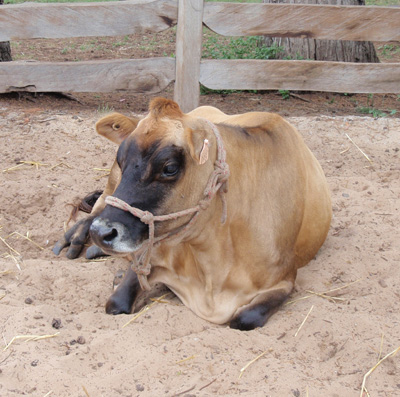
Photo Credit: Eve Kushner
And yet I suddenly understood so much more. Each stomach must fulfill a different task in the digestive process. (Yes, I've now confirmed this here and there, although I've also learned that there aren't actually several stomachs but rather four chambers in one stomach.)
Equipped with this new information, I found that the meanings of "ruminate" snapped into focus. Here they are again:
1. to chew the cud, as a ruminant.
2. to meditate; muse; ponder.
The first meaning must be the original one, the bovine one. The second has to be a metaphorical spinoff. (Yes, I've now confirmed that, too!) This must be why we say, "I'm going to go chew on that for awhile," meaning, "I'm going to work it over in my mind." The whole swirl of thoughts figuratively serve as a mental cud.
Bells were definitely going off for me! (Thanks, Rita Mae! I owe you so much!)
I managed to explain all these connections to Kensuke-san, who observed that one Japanese word has the same literal and metaphorical meanings:
反芻 (はんすう: (1) rumination; regurgitation; chewing the cud; (2) turning over in one's mind; thinking over something; pondering; musing; rumination (about a subject))
The second kanji, which is non-Joyo, is ultra-cool! I love duplicated shapes in characters. And then look at those blades of grass in 勹, which is Radical 20, the "wrapping" radical. In fact, as I've since discovered, the "grass" radical 艸 (which we always write more simply as 艹 in Joyo kanji) is on duty in 芻. Meanwhile, 勹 is a mere component. That's a surprise; I wouldn't have expected the two blades of grass to be so essential here, given that they've been separated and stacked.
As I've now learned from Kanjigen, 芻 combines the meanings of both radicals; if you tie (勹) grass (艸) together firmly, you have bales of hay. Indeed, 芻 means "hay; grass cutting."
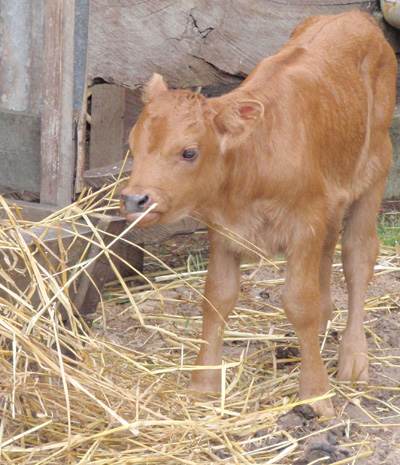
Photo Credit: Eve Kushner
As for 反 (371), it usually means "counter-, anti-," but it can also mean "reverse, to return in the original direction," which certainly seems appropriate for a regurgitated cud. The hay returns to the mouth for a good chew—or a good think, figuratively.
My mind on fire, I attempted one more connection: はんすう sounds a lot like はんせい, I said to Kensuke-san. By はんせい I meant 反省 (reflection, reconsideration, introspection, meditation, contemplation). Those definitions are forms of mental cud chewing. Did one word evolve from the other?
He didn't think so. Oh, well. Looks like I've chewed one cud too many!
It doesn't matter. I enjoyed myself thoroughly. In fact, in the spirit of Amy Chavez, who runs the Moooo! Bar and Calfe on Shiraishi Island (in the Seto Inland Sea and in Okayama Prefecture), I might say instead that I very much a-moo-sed myself!
For your a-moo-sement, here's a preview of essay 1936 on 郎, which came out today:
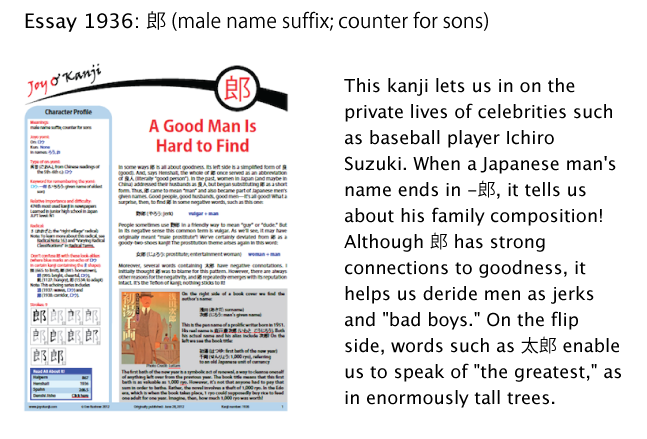
I'll be off next week, chewing a million mental cuds as I feast on all the kanji around me! I hope you have a great two weeks!

Comments